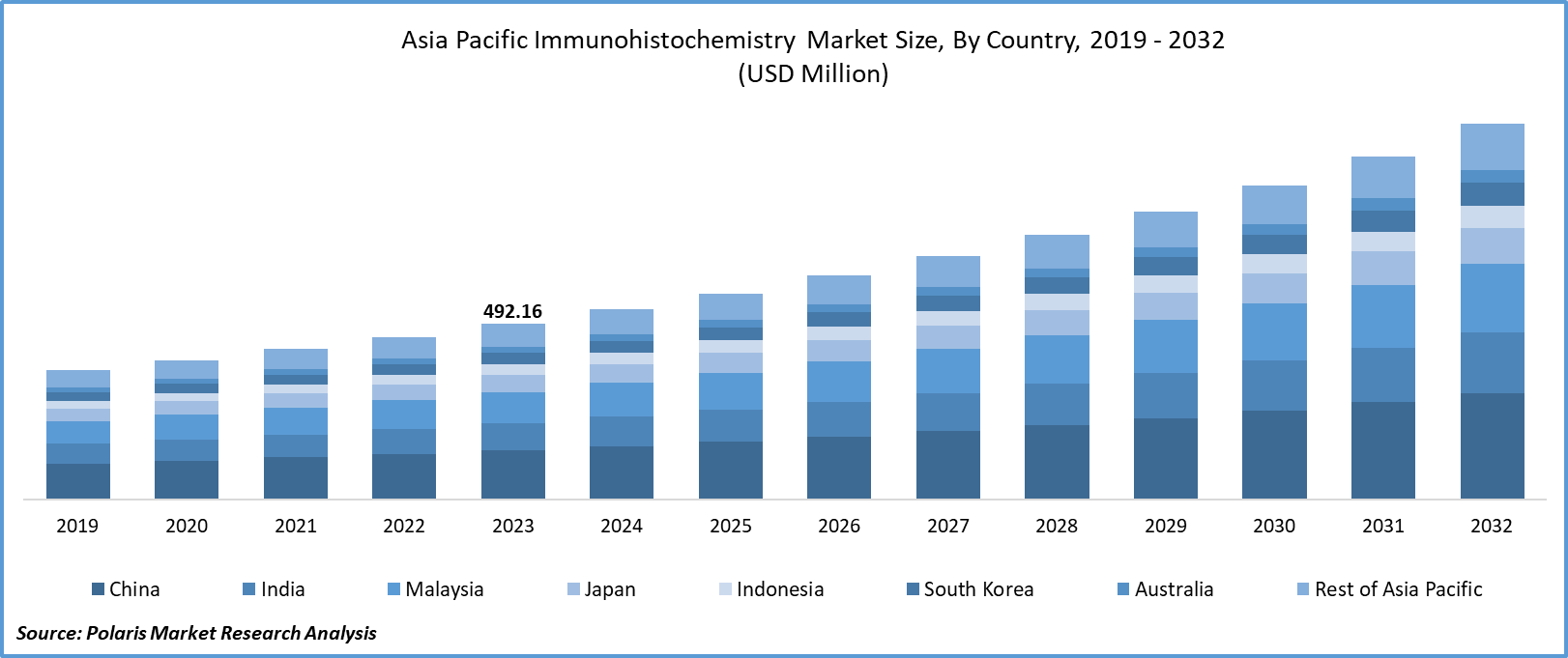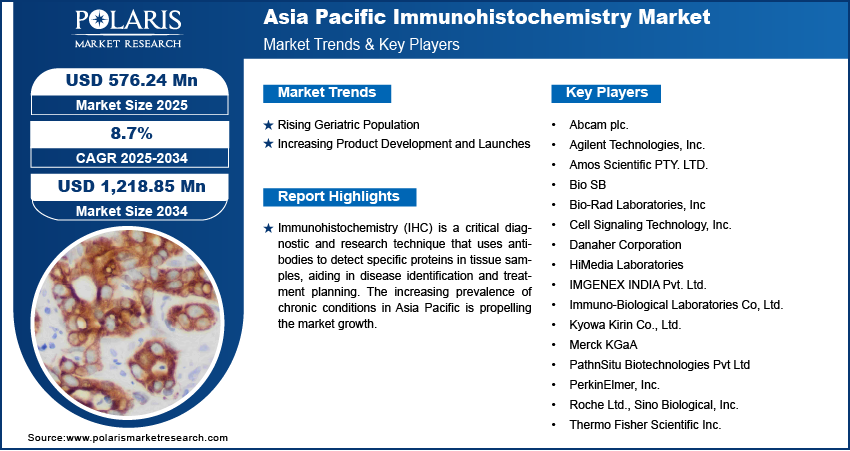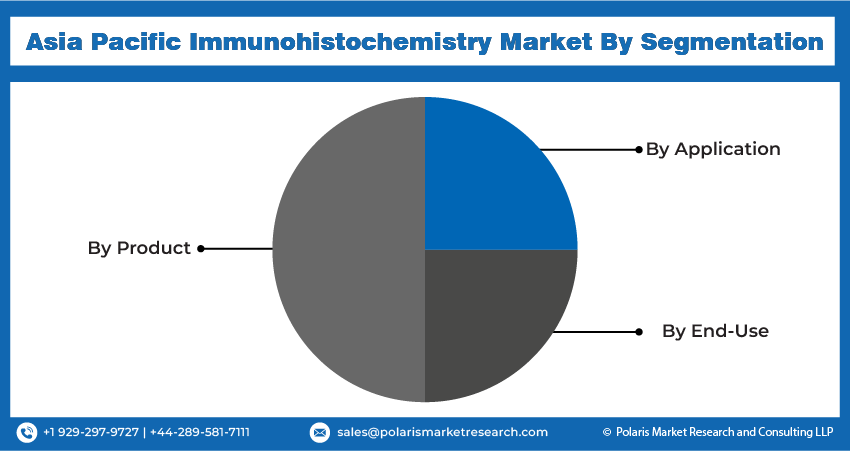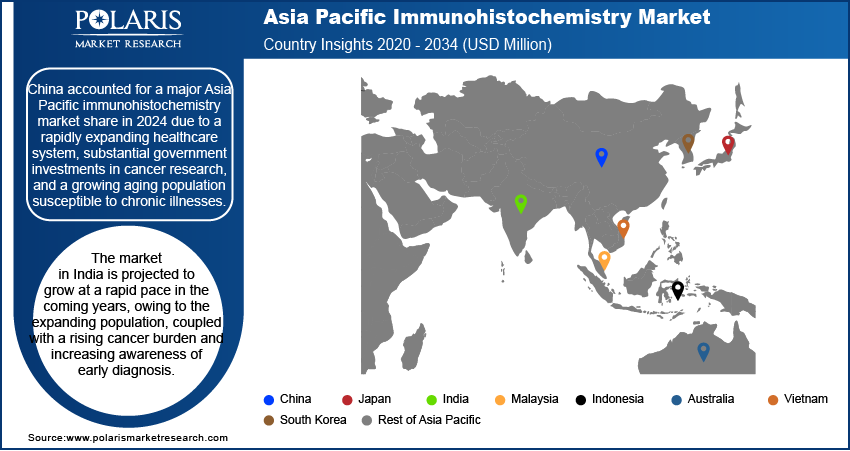
Asia Pacific Immunohistochemistry Market Share, Size, Trends & Industry Analysis Report
By Product (Antibodies, Reagents, Equipment, and Kits), By Application, By End Use, and By Country; Segment Forecast, 2025 - 2034
- Published Date:Aug-2025
- Pages: 130
- Format: PDF
- Report ID: PM4323
- Base Year: 2024
- Historical Data: 2020-2023
Market Overview
The global Asia Pacific Immunohistochemistry Market was valued at USD 531.20 million in 2024 and is anticipated to grow at a CAGR of 8.70% from 2025 to 2034. Rising prevalence of chronic diseases, increasing adoption of personalized medicine, and growing investments in diagnostic infrastructure are driving regional market expansion.
Immunohistochemistry (IHC) is a critical diagnostic and research technique that uses antibodies to detect specific proteins in tissue samples, aiding in disease identification and treatment planning. Immunohistochemistry is crucial in oncology clinical trials, where it identifies tumor-specific markers for cancers such as breast, lung, and liver. Immunohistochemistry also supports companion diagnostics, determining patient eligibility for targeted therapies. It is increasingly used in infectious disease screening and biomarker validation.
The increasing prevalence of chronic conditions in Asia Pacific is propelling the Asia Pacific immunohistochemistry market growth. Chronic conditions such as cancer, cardiovascular disorders, and autoimmune conditions require precise identification of tissue abnormalities and biomarker expression to guide effective treatment decisions. Immunohistochemistry allows clinicians to detect specific antigens in tissue samples, enabling them to classify disease subtypes and predict effective treatment plans. The growing burden of chronic illnesses is also fueling research into new therapies, where immunohistochemistry is needed for studying disease mechanisms and evaluating drug efficacy. According to data published by the Global Cancer Observatory, the cancer incidence in Asia was 169.1 per 100,000 in 2020, accounting for 49.3% of the global cancer incidence. Therefore, the rising incidence of chronic conditions in Asia Pacific ensures a sustained and expanding need for immunohistochemistry in both clinical and research laboratories.

To Understand More About this Research: Request a Free Sample Report
The Asia Pacific immunohistochemistry market demand is driven by the rising healthcare spending. Governments and private healthcare providers are allocating more funds and resources to improve the quality and accessibility of diagnostic services, which includes the adoption of immunohistochemistry techniques. India's total health expenditure rose to Rs. 9,04,461 crores or USD 10,492 million in 2021-2022, constituting 3.83% of GDP. The financial support also encourages the integration of immunohistochemistry into routine diagnostic workflows, particularly for cancer detection and personalized treatment planning. Additionally, rising healthcare expenditure in countries such as China, India, and Australia is allowing wider implementation of screening programs and early detection initiatives, further increasing the need for accurate, tissue-based diagnostic tools such as immunohistochemistry.
Market Dynamics
Rising Geriatric Population
Older adults usually face a higher risk of developing chronic conditions such as cancer, neurodegenerative disorders, and cardiovascular diseases, all of which benefit from detailed tissue diagnostic and analysis. Immunohistochemistry enables pathologists to detect specific cellular markers and understand disease mechanisms at a molecular level, making it an essential tool in diagnosing chronic conditions found in elderly patients. Additionally, hospitals and research centers in countries such as China and India are prioritizing immunohistochemistry in clinical labs to deliver more accurate diagnoses, guide treatment plans, and improve patient outcomes in the rising geriatric population. The United Nations Population Fund, in its 2023 report, projected that the population of people aged 80+ years in India will grow at a rate of around 279% between 2022 and 2050. Hence, the rising geriatric population boosts the Asia Pacific immunohistochemistry market expansion.
Increasing Product Development and Launches
Companies in the Asia Pacific immunohistochemistry market are continuously introducing advanced antibodies, detection systems, staining kits, and automated platforms that improve the speed, accuracy, and reproducibility of immunohistochemistry procedures. In March 2023, Aptamer Group introduced Optimer-Fc, a new reagent for automated immunohistochemistry workflows. These innovations attracted greater adoption across hospitals, diagnostic laboratories, and research institutes, as they simplified workflows and enhanced diagnostic capabilities. The introduction of multiplex assays allowed the simultaneous detection of multiple biomarkers, which supports more comprehensive disease profiling. Additionally, new product launches tailored to emerging applications, such as personalized medicine and targeted therapy selection, drive broader adoption of immunohistochemistry in both clinical and research laboratories.

Segment Insights
Market Evaluation by Product
Based on product, the market is divided into antibodies, reagents, equipment, and kits. The antibodies segment dominated the Asia Pacific immunohistochemistry market share in 2024 due to their critical role in diagnostic and research applications. Researchers and clinicians across countries such as China, Japan, and India relied heavily on antibodies for the detection and analysis of specific cellular proteins, particularly in cancer diagnostics. The segment benefited from the rising incidence of cancer and other chronic diseases, which increased the demand for precise biomarker identification. Technological advancements in monoclonal and polyclonal antibody production also enhanced specificity and sensitivity, making them crucial in both clinical and academic laboratories. Moreover, expanding healthcare infrastructure and increased investments in life sciences research contributed to the segment's strong performance.
The kits segment is expected to grow at a rapid pace in the coming years, owing to its growing adoption in diagnostic laboratories and research institutions. These kits offer standardized, ready-to-use solutions that simplify complex immunohistochemical procedures, significantly reducing time and error in staining processes. The rising need for high-throughput analysis in cancer diagnostics and personalized medicine is further propelling the demand for kits. Additionally, the shift toward automation in laboratory workflows, especially in emerging economies such as South Korea and Indonesia, supports the expansion of kits. Manufacturers are also innovating to develop multiplex kits that allow simultaneous detection of multiple biomarkers, further enhancing diagnostic accuracy and efficiency, which is estimated to fuel the growth of the segment.
Market Insight by End Use
In terms of end use, the market is segregated into hospitals and diagnostic laboratories, research institutes, and others. The hospitals and diagnostic laboratories segment accounted for a major market share in 2024 due to increasing demand for accurate and early disease diagnosis. The surge in cancer prevalence across countries such as China, India, and Japan fueled the adoption of immunohistochemistry techniques in pathology departments for tumor classification and biomarker detection. Hospitals continued to invest in advanced diagnostic tools and trained personnel to enhance their diagnostic capabilities, while the growing availability of specialized immunohistochemical assays in hospitals enabled faster and more precise analysis of tissue samples. Additionally, government initiatives aimed at improving healthcare infrastructure and expanding access to diagnostic services further supported the dominance of the segment.

Country Outlook
By country, the Asia Pacific immunohistochemistry market report provides insight into China, Japan, India, Australia, and the Rest of APAC. China accounted for a major market share in 2024 due to a rapidly expanding healthcare system, substantial government investments in cancer research, and a growing aging population susceptible to chronic illnesses. Hospitals and research institutions in China significantly increased the adoption of immunohistochemical techniques to support precision diagnostics and personalized treatment strategies, particularly in oncology. The government's Healthy China 2030 initiative further accelerated advancements in medical infrastructure, facilitating the widespread integration of advanced diagnostic tools such as immunohistochemistry. Additionally, the presence of a strong domestic biotechnology sector enhanced local production and availability of immunohistochemistry-related products, contributing to the dominance of the country.
The Immunohistochemistry industry in India is projected to grow at a rapid pace in the coming years, owing to the expanding population, coupled with a rising cancer burden and increasing awareness of early diagnosis. Private and public healthcare providers in the country have started to adopt immunohistochemistry more extensively to improve diagnostic accuracy and clinical outcomes. Furthermore, India’s burgeoning pharmaceutical and biotechnology industries, along with growing academic research output, have strengthened the integration of immunohistochemistry in drug discovery and translational studies. Government-backed initiatives such as Ayushman Bharat and Make in India continue to drive infrastructure development and incentivize domestic manufacturing, making the country a key region in the industry.

Key Players and Competitive Analysis
The Asia Pacific immunohistochemistry (IHC) market is highly competitive, with global and regional players competing for market share through innovation, strategic partnerships, and expansion. Major multinational companies such as Thermo Fisher Scientific and Merck KGaA dominate the industry, leveraging advanced technologies, extensive product portfolios, and strong distribution networks. These players focus on automation, precision diagnostics, and novel biomarkers to enhance IHC applications in cancer diagnostics and research. Strategic collaborations, mergers, and acquisitions are common in the industry, with firms seeking to strengthen their market position. Additionally, increasing investments in digital pathology and AI-powered IHC analysis are reshaping competition.
The industry is fragmented, with the presence of numerous regional players. Major players in the market are Abcam plc.; Agilent Technologies, Inc.; Amos Scientific PTY. LTD.; Bio SB; Bio-Rad Laboratories, Inc.; Cell Signaling Technology, Inc.; Danaher Corporation; HiMedia Laboratories; IMGENEX INDIA Pvt. Ltd.; Immuno-Biological Laboratories Co, Ltd.; Kyowa Kirin Co., Ltd.; Merck KGaA; PathnSitu Biotechnologies Pvt Ltd; PerkinElmer, Inc.; Roche Ltd.; Sino Biological, Inc.; and Thermo Fisher Scientific Inc.
Agilent Technologies, Inc., a global company in life sciences, diagnostics, and applied chemical markets, provides critical analytical tools and services for laboratories worldwide, including advanced solutions for immunohistochemistry (IHC). Headquartered in Santa Clara, California, Agilent operates across 110 countries with approximately 18,000 employees. In Asia Pacific, Agilent has established a robust presence, particularly through its Singapore hub, which serves as the Asia Pacific headquarters for key functions such as corporate controllership, IT, and regional customer operations. The company’s focus on IHC aligns with the region’s rapid IHC industry growth, driven by technological advancements, increasing demand for personalized medicine, and a rising geriatric population. Agilent’s IHC portfolio includes reagents, antibodies, and diagnostic kits.
Cell Signaling Technology, Inc. (CST), founded in 1999 and headquartered in Danvers, Massachusetts, is a privately held life sciences company specializing in high-quality antibodies, ELISA kits, and reagents for studying cell signaling pathways, including tools for immunohistochemistry (IHC). CST has expanded its Asia Pacific (APAC) presence with subsidiaries in China and Japan. The company’s APAC strategy focuses on supporting cancer research, neuroscience, immunology, and epigenetics through localized facilities, including its Shanghai Global Innovation and Training Academy, which offers technical workshops and collaborates with institutions such as the Chinese Society of Cell Biology.
List of Key Companies in Asia Pacific Immunohistochemistry Market
- Abcam plc.
- Agilent Technologies, Inc.
- Amos Scientific PTY. LTD.
- Bio SB
- Bio-Rad Laboratories, Inc
- Cell Signaling Technology, Inc.
- Danaher Corporation
- HiMedia Laboratories
- IMGENEX INDIA Pvt. Ltd.
- Immuno-Biological Laboratories Co, Ltd.
- Kyowa Kirin Co., Ltd.
- Merck KGaA
- PathnSitu Biotechnologies Pvt Ltd
- PerkinElmer, Inc.
- Roche Ltd.
- Sino Biological, Inc.
- Thermo Fisher Scientific Inc.
Asia Pacific Immunohistochemistry Industry Developments
In July 2024 – Indica Labs expands HALO digital‑pathology platform into Asia Pacific territories
September 2023: Cell Signaling Technology (CST), a life science discovery technology company, announced the launch of its SignalStar Multiplex IHC technology, a revolutionary new tool for spatial biology research using mid-plex, high-throughput immunohistochemistry (IHC) assays.
January 2023: Agilent Technologies, Inc. announced a partnership with Akoya Biosciences, Inc. to develop multiplex-immunohistochemistry diagnostic solutions for tissue analysis.
Asia Pacific Immunohistochemistry Market Segmentation
By Product Outlook (Revenue, USD Million, 2020–2034)
- Antibodies
- Primary Antibodies
- Secondary Antibodies
- Reagents
- Histological Stains
- Blocking Sera and Reagents
- Chromogenic Substrates
- Fixation Reagents
- Organic Solvents
- Proteolytic Enzymes
- Diluents
- Other Reagents
- Equipment
- Slide Staining Systems
- Tissue Microarrays
- Tissue Processing Systems
- Slide Scanners
- Others
- Kits
By Application Outlook (Revenue, USD Million, 2020–2034)
- Diagnostics
- Cancer
- Infectious Diseases
- Cardiovascular Diseases
- Autoimmune Diseases
- Diabetes Mellitus
- Nephrological Diseases
- Others
- Research
By End Use Outlook (Revenue, USD Million, 2020–2034)
- Hospitals and Diagnostic Laboratories
- Research Institutes
- Others
By Country Outlook (Revenue, USD Million, 2020–2034)
- China
- Japan
- India
- Australia
- Rest of APAC
Asia Pacific Immunohistochemistry Market Report Scope
|
Report Attributes |
Details |
|
Market Value in 2024 |
USD 531.20 Million |
|
Market Forecast in 2025 |
USD 576.24 Million |
|
Revenue Forecast in 2034 |
USD 1,218.85 Million |
|
CAGR |
8.7% from 2025 to 2034 |
|
Base Year |
2024 |
|
Historical Data |
2020–2023 |
|
Forecast Period |
2025–2034 |
|
Quantitative Units |
Revenue in USD Million and CAGR from 2025 to 2034 |
|
Report Coverage |
Revenue Forecast, Competitive Landscape, Growth Factors, and Trends |
|
Segments Covered |
|
|
Country Scope |
|
|
Competitive Landscape |
|
|
Report Format |
|
|
Customization |
Report customization as per your requirements with respect to countries, regions, and segmentation. |
FAQ's
The market size was valued at USD 531.20 million in 2024 and is projected to grow to USD 1,218.85 million by 2034.
The market is projected to register a CAGR of 8.7% during 2025–2034.
China had the largest share of the market in 2024.
A few of the key players in the market are Abcam plc.; Agilent Technologies, Inc.; Amos Scientific PTY. LTD.; Bio SB; Bio-Rad Laboratories, Inc.; Cell Signaling Technology, Inc.; Danaher Corporation; HiMedia Laboratories; IMGENEX INDIA Pvt. Ltd.; Immuno-Biological Laboratories Co, Ltd.; Kyowa Kirin Co., Ltd.; Merck KGaA; PathnSitu Biotechnologies Pvt Ltd; PerkinElmer, Inc.; Roche Ltd.; Sino Biological, Inc.; and Thermo Fisher Scientific Inc.
The hospitals and diagnostic laboratories segment dominated the market revenue in 2024.
The kits segment is expected to grow at the fastest pace in the coming years.
